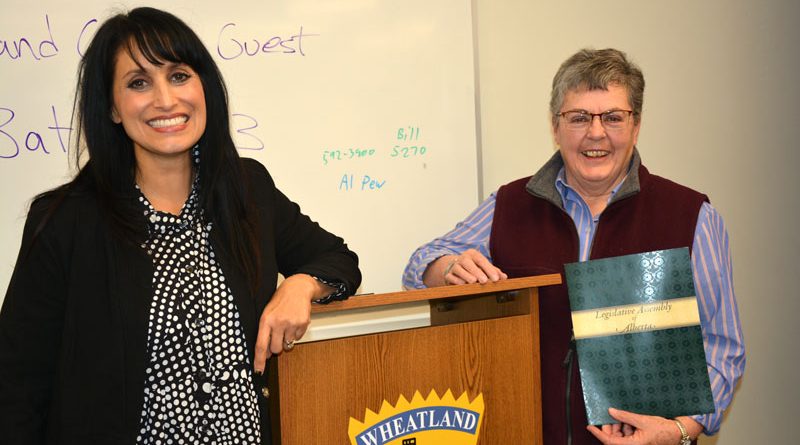Aheer presents at Rural Crime Watch meeting
By Janet Kanters Times Editor


Janet Kanters Photo
Chestermere-Strathmore MLA Leela Aheer attended the Wheatland District Rural Crime Watch monthly meeting last week, to update the group on the government’s plans to mitigate crime in the province’s rural areas.
The government has been introducing a flurry of new legislation to deal with rural crime in Alberta, including Bill 27, the Trespass Statutes (Protecting Law-Abiding Property Owners) Amendment Act, which has received first reading in the legislature.
“We have a couple of things that we’re bringing forward, such as Bill 27,” said Aheer. “A lot of this was done in consultation with landowners.”
If Bill 27 is passed, amendments to the Occupiers’ Liability Act would better protect law-abiding property owners from civil liability for injuries to trespassers where the owner has reasonable grounds to believe the trespasser is committing, or about to commit, a criminal offence. The amendments would be retroactive to Jan. 1, 2018.
According to the government, the proposed legislation would also strengthen deterrents to trespassing through amendments to trespass laws. This includes five-fold increases to maximum fines for trespassing, with fines of up to $10,000 for a first offence and up to $25,000 for subsequent offences, as well as possible prison time of up to six months. Corporations that help or direct trespassers would face fines up to $200,000 — a first for Canada. In addition, the maximum amount a court may order for loss or damage to property would be raised from $25,000 to $100,000.
Bill 27 would also better protect farmers and ranchers from harassment and occupation by protesters, which are actions that risk introducing disease and threaten the welfare of animals. This includes amending the Petty Trespass Act to add explicit references to land used for crops, animal-rearing and beekeeping. Once these changes came into force, Alberta would be the first province to have offences and penalties for creating a biosecurity hazard to animals.
Aheer noted that in rural areas, police can be stretched across large distances, which can lead to longer response times. To help reduce response times, the government is creating the Rural Alberta Provincial Integrated Defence Force – the RAPID Force – by expanding the roles and authorities of 400 peace officers in the Fish and Wildlife Enforcement Branch, Commercial Vehicle Enforcement Branch and the traffic arm of the Alberta Sheriffs. The changes will allow these officers to respond to a wider range of calls and to assist the RCMP and other police services in some emergencies. Training and related planning is underway, to have the first of these officers available to assist rural Albertans by fall 2020.
“There’s been so many times in the last little while that when you’re a victim of crime, you end up becoming the person who’s not the victim anymore … it always seems you’re not the ones that are at the forefront of what’s going on,” said Aheer. “(With this) new legislation there’s a strategy behind it and we can make sure that the work that is being done on the ground is effective.”
Government has also proclaimed the Scrap Metal Dealers and Recyclers Identification Act to deter metal theft by making it more difficult for criminals to monetize stolen material by selling it for scrap. The Act was passed in 2012, but never proclaimed. An Order in Council signed Nov. 5 puts the legislation into effect immediately.
“There’s work being done around a lot of the copper wire and whatnot that’s being stolen off a lot of property,” noted Aheer. “A lot of city folks don’t understand what that is or why it’s important, but metal theft is a significant public safety risk.”
Criminals often steal metal from property owners and critical infrastructure in isolated areas to avoid detection. This has also made rural Albertans a target of trespassers and thieves looking for metal.
The government is also offering a new voice for victims. A new program will enable communities to take part in the sentencing of offenders by letting them submit a statement describing how the crime has affected the community as a whole – including the emotional, physical and economic impact, or fears they may have for their own security.
A community impact statement could be written on behalf of any group of people, such as those in a geographic area, diverse segments of the population, and groups affected by the crime.
Community impact statement forms will be available online in early January.
There will also be additional support for victims, via a new Restitution Recoveries Program. The program will help victims collect outstanding payments on restitution orders by giving government the authority to use enforcement measures against offenders, such as garnishing wages or seizing and selling property, as needed. This program will reduce red tape for victims who would otherwise have to navigate the legal system and attempt to collect court-ordered restitution at their own risk, effort and expense.
On Nov. 25, the government announced it is strengthening the province’s justice system by doubling the number of articling students hired by the government and placing them in rural Alberta and smaller judicial districts. This measure is in addition to fulfilling the budget commitment of hiring an additional 50 new Crown prosecutors.
“Thank you to all of you for your rural crime watch,” said Aheer. “We do care deeply about what’s going on, and the presence that you have here, it shows how much you care, too.”
